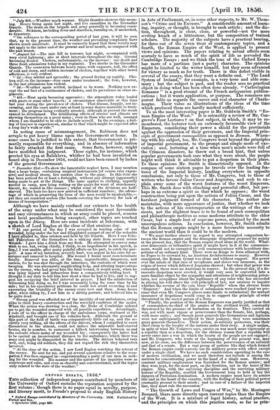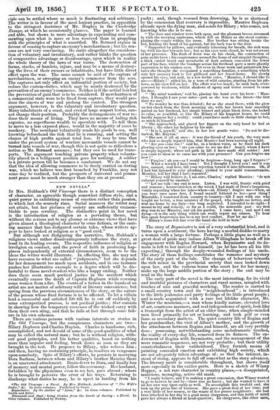OXFORD ESSAYS, 1856.•
Tins collection of independent papers contributed by members of the University of Oxford sustains the reputation acquired by the first volume ; though there is no paper equal in novelty, purpose, and literary merit, to Froude's proposal to study English History
• Oxford _Essays contributed by Members of the University. 1856. Published by Parker and Son. 1. Spectator 1855, page 496. in Acts of Parliament, or, in some other respects, to Mr. W. Thom- son's " Crime and its Excuses." A considerable amount of learn- ing, inquiry, or thought, is brought to each article ; and the dic- tion, throughout, is clear, close, or powerful—not the mere writing knack of a litterateur, but the composition of trained scholars. The majority of the subjects have a practical bearing, for three out of the seven treat of contemporary topics, and a fourth, the Roman Empire of the West, is applied to present views and opinions. The papers relating to actual affairs seem scarcely to have so much of the spirit of life as pervaded the Cambridge Essays ; and we think the tone of the Oxford Essays has more of a partisan (not a party) character. The opinions might be limited to the writer himself, but they seem advanced for victory as much as for truth. There is this defect visible in several of the essays, that they want a definite end. " The Land System of Ireland," for example, is a very terse and able sum- mary ; but the subject is past, and the reader sees no practical object in doing what has been often done already. " Carlovingian Romance" is a good résumé of the French antiquarian publioa- cations ; but it wants application, or purpose. The romances are purest fable as regards the career and real character of Charle- magne. Their value as illustrations of the ideas of the time which produced them are hardly marked sufficiently.
To us the most interesting paper is Mr. Goldwin Smith's "Ro-
man Empire of the West." It is ostensibly a review of Mr. Con- grove's Four Lectures t on that subject, in which, it may be re- membered, the lecturer took an extremely favourable view of the Emperors, considering their power a shield for the provincials against the oppression of their governors, and the Imperia.vi prin- ciple of government cosmopolitan as opposed to Roman. Warm-
ing with his subject, too, Mr. Congreve went beyond the principles of imperial government, to the prompt and simple mode of exe- cution; and, lecturing at a time when men's minds were full of the Crimean disasters, he threw out a broad hint, that unless popular governments took care what they were about, the people might well think it advisable to put a despotism in their place. To these opinions Mr. Smith is diametrically opposed. In the compass of some sixteen pages he travels over the leading fea- tures of the Imperial history, landing everywhere in opposite conclusions, not only to those of Mr. Congreve, but to those of writers who favour Julius Ctesar and Augustus, and seek to ex- plain away some of the worst features of the worst Emperors. This Mr. Smith does with clinching and powerful effect, but per- haps in as extreme a spirit as that which he opposes ; the worst construction being put upon the actions of Julius Ctesar, and the harshest judgment formed of his character. The author also maintains, with more appearance of justice, that whether we look to the actions of his contemporaries or the writings of the an- cients, not the slightest trace is to be found of such cosmopolitan and philanthropic motives as some moderns attribute to the elder Caesar, but a simple lust of supreme power, attained by the most unscrupulous actions. In conclusion, 'however, Mr. Smith admits that the Roman empire might be a more favourable necessity to the ancient world than it could be to the modern.
"We must further observe in regard to any attempted comparison be-
tween the Roman empire and the demagogic despotism proposed for society at the present day, that the Roman empire stood alone in the world. What- ever democratic or tribunitive spirit it might have in it at the commence- ment, would not be corrupted by evil communications with hereditary des- potisms of an ordinary kind. There were no Kings to form alliances with, no Popes to be crowned by, no Austrian Archduchesses to marry. However omnipotent., the Roman tyrant was alone and without support. His power over the minds of that race of sycophants and slaves was immense, as the reigns of terror which followed Augustus showed; but when that power was
• exhausted, there were no Austrians in reserve. In the present day, ifs de- mocratic despotism were erected, it would very soon be converted into a more familiar object by the sympathy and attentions of neighbouring poten- tates, not scrupulous about the legitimacy of any ruler who has succeeded in placing his will above the evil principle of law, nor anxious to inquire whether the reverse of the coin bears'Republic' when the obverse bears Emperor.' And when the limits of submission were reached (and we pre- sume that even Mr. Congreve places some limits to submission) the mutual insurance of despotisms would come in to support the principle of order threatened in the sacred person of a Nero.
"Finally, the position of the Roman Emperors was partly justified as that of commanders-in-chief of the armies of the civilized world, constantly threatened by the pressure of barbarism on its frontiers. They carried on war, not with more vigour or perseverance than the Senate, but, perhaps, with more unity; and though great generals like Germanicus and Agricola were not imfrequently sacrificed to their jealousy, they were sometimes great generals themselves. Their action, as military protectors, was their chief claim to the loyalty of the nations under their sway. A single nation, in spite of what Mr. Congreve says, carries on war much more vigorous'y as a republic than as a despotism, for the obvious reason that a republic will never enter into a war in which the hearts of the people are not engaged ; and Mr. Congreve, who wrote at the beginning of the present war, may now, at its close, see the difference between the perseverance of an autoe„rat and that of a senate. But a vast group of nations like that which formed the Roman empire could scarcely use its military power with effect exeept under a single chief. We have no such consideration operating in the case of modern civilization, and we must therefore not include it among the motives for concentrating power in the hand of a single man. Moreover, constant military employment was furnished for the Roman armies ; and they were kept, for the most part, on the frontiers, not in the heart of the empire. This, with the surviving discipline and the surviving military honour of the Republic, enabled the Government long to hold at bay the dangers of Prretorian domination. A modern empire must have its armies idle and in the heart of the country, with the feeling of their political power constantly present to their minds ; and in case of a failure of the imperial line, they must rule the succession."
"The Growth of Laws and Usages of War," by Mr. Montague Bernard, btars more directly upon current topics than the Empire of the West. It is a mixture of legal history, actual practice, and the principles on which this practice rests, so far as prin-
ciple can be settled where so much is fluctuating and arbitrary. The writer is in favour of the most lenient practice in opposition to the stringent doctrines of Mr. Hughes in the Cambridge Essays, at which he occasionally glances. The paper is learned and able, but shows to more advantage in expounding and com- menting upon what is more or less received than in grappling with the principles of what is unsettled. Mr. Bernard argues in favour of ceasing to capture an enemy's merchantmen ; but his re.a- sons are not very convincing. He omits altogether the considera- tion of voluntary and involuntary, and rather blinks the question of comparative advantage or disadvantage upon which in reality the whole theory of the laws of war turns. The destruction of farms stacks, or hamlets, injure, and may be a means of destroy- ing the lives of their owners or inhabitants, but have little direct effect upon the war. The same cannot be said of the capture of merchantmen, or sweeping an enemy's commerce from the seas. The captures not only affect an influential portion of society, but reduce the custom-duties, which may be nearly destroyed by the prevention of an enemy's commerce. Neither is it the actual loss but the prevention of gain that is to be considered. If merchantmen of a commercial state were to be freed from capture, they would pro- duce the sinews of war and prolong the contest. The strongest argument, however, is the voluntary and involuntary question. Many inhabitants of a coast, and even of large seaport towns, can- not change their position. Probably the derangements of war re- duce their means of living. They have no means of lading rich argosies, no superfluous wealth to speculate with. To tell them to move to a less exposed place, would in the majority of eases be mockery. The merchant voluntarily sends his goods to sea well knowing beforehand the risk that he is running, and setting the chance of high profits against total loss. It may be true that under the present system of warfare mercantile vessels cannot be turned into vessels of war, though this is not quite so ridiculous a notion as Mr. Bernard assumes; but they can be used for trans- ports. The argument touching private property when volunta- rily placed in a belligerent position goes for nothing. A soldier is a private person ffil he becomes a combatant. We do not say that the idea of allowing commerce to be freely carried on during war, which we believe was first broached by Franklin, may not some day be realized, but the prospects of universal and perma- nent peace must be much stronger than they are at present.



























 Previous page
Previous page